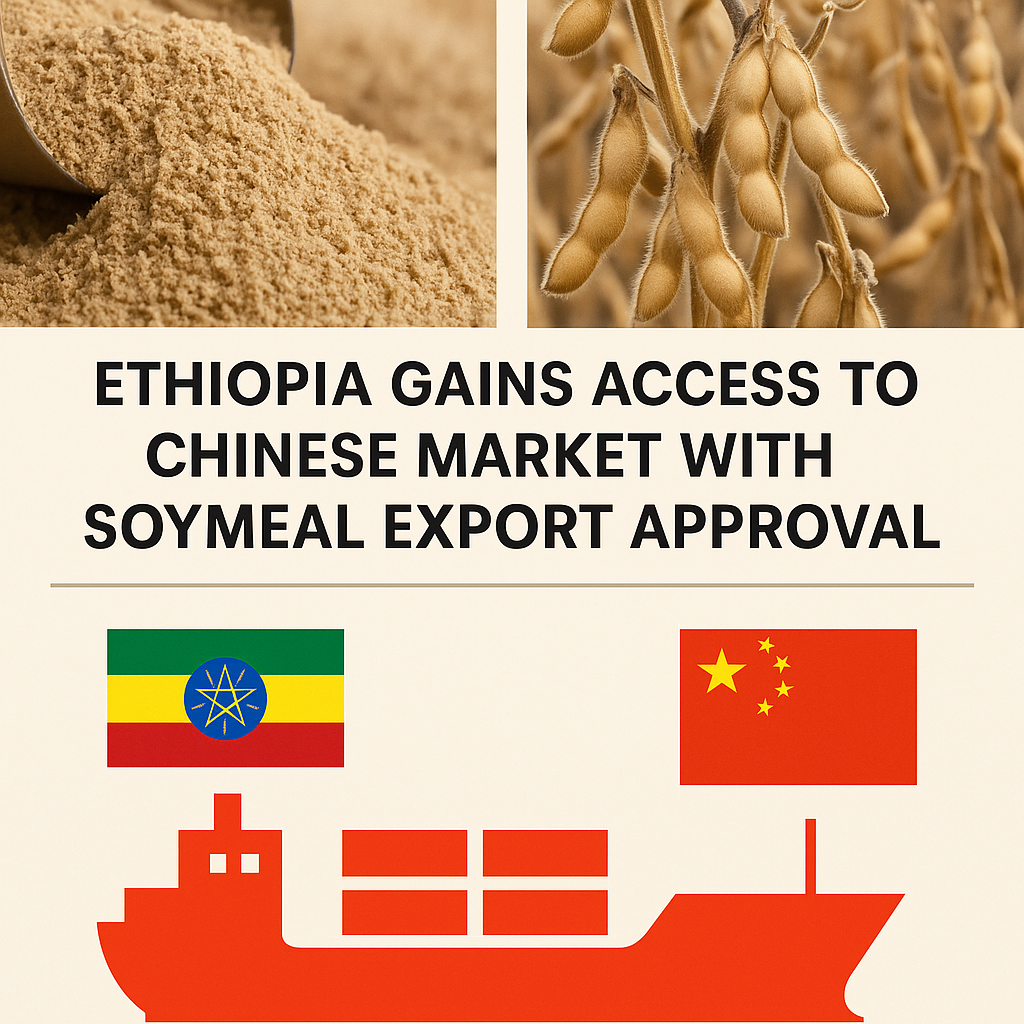In a landmark move reflecting shifting global trade dynamics, China has officially authorized the import of soybean meal from Ethiopia. This strategic development, announced on July 3, 2025, signifies not only a deepening of Sino-Ethiopian agricultural ties but also a broader pivot in China’s global sourcing strategy toward diversification and supply chain resilience.
From Raw Beans to Value-Added Trade
Until recently, Ethiopia’s soybean exports to China were limited to raw, unprocessed beans. In 2024 alone, the country shipped over 29,000 tonnes of raw soybeans to China, earning nearly $18 million in export revenue (Reuters, 2025). The newly approved soymeal trade represents a significant upgrade—positioning Ethiopia as not just a raw supplier but an emerging player in the value-added agricultural processing space.
This approval required Ethiopia to meet China’s stringent phytosanitary standards, including pest control and processing protocols. The certification now enables Ethiopian producers and processors to tap into a market traditionally dominated by global soybean giants such as Brazil, the United States, and Argentina.
China’s Search for Stable Supply Chains
The green light for Ethiopian soymeal comes amid China’s broader efforts to diversify its feed protein sources, particularly in the face of increasing geopolitical uncertainties and trade friction with the United States. By reducing its reliance on a narrow pool of suppliers, China is aiming to ensure greater food security for its livestock and poultry sectors, which heavily rely on imported soymeal as a key feed ingredient.
Earlier in 2025, China resumed imports from Argentina and Uruguay, and began sourcing from countries like Russia and Belarus as well. Ethiopia’s inclusion in this list signals China’s growing interest in alternative, stable sources from the Global South (Reuters, 2025).
Small Steps, Long-Term Potential
While Ethiopia’s soymeal volumes are expected to be small in the short term compared to China’s massive demand—estimated at around 60,000 tonnes globally in 2024/25—the long-term implications are profound. The move lays a foundation for future trade expansion, investment in processing infrastructure, and greater competitiveness for African nations in high-value agricultural markets.
According to Ethiopia’s Ministry of Agriculture, soybean production has reached over 260,000 tonnes in 2025, across approximately 105,000 hectares of land. These figures suggest significant growth potential if proper investments in storage, processing, and logistics continue.
Implications for Ethiopia’s Agricultural Strategy
For Ethiopia, this development isn’t just about revenue—it’s a chance to elevate the national agricultural value chain. Moving beyond bulk commodity exports to processed goods means higher returns, more employment opportunities in agro-processing, and stronger trade leverage.
This step also incentivizes broader public-private investment in the soybean sector, including improvements in seed quality, post-harvest handling, and compliance systems. Furthermore, with the Chinese market now open to its processed soymeal, Ethiopia can position itself as a regional hub for agro-processing and export.
Building a Resilient Agricultural Trade Framework
This trade deal exemplifies a broader trend where African nations are becoming more integrated into global agricultural supply chains, not just as suppliers of raw materials, but as contributors to processed and semi-finished goods. As trade barriers evolve globally—especially in the wake of shifting tariff regimes and climate-related supply shocks—partnerships like this one become vital to resilient and diversified supply systems.
Conclusion
Ethiopia’s entry into China’s soymeal market may appear modest at first glance, but it’s a strategic step that could redefine the country’s trade prospects. It reflects the growing maturity of Africa’s agricultural exports and the shifting priorities of a China eager to build more stable and diversified global supply chains.
If successfully scaled, this partnership could serve as a blueprint for other African nations aiming to move up the agricultural value chain, meet global standards, and participate more meaningfully in the trade of processed goods.
Source:
Reuters. (2025, July 7). China approves Ethiopian soymeal imports to diversify supply. https://www.reuters.com/world/africa/china-approves-ethiopian-soymeal-imports-diversify-supply-2025-07-07/
Feed Business Middle East & Africa. (2025, July 11). China opens market to Ethiopian soybean meal in strategic trade shift. https://www.feedbusinessmea.com/2025/07/11/china-opens-market-to-ethiopian-soybean-meal-in-strategic-trade-shift/


